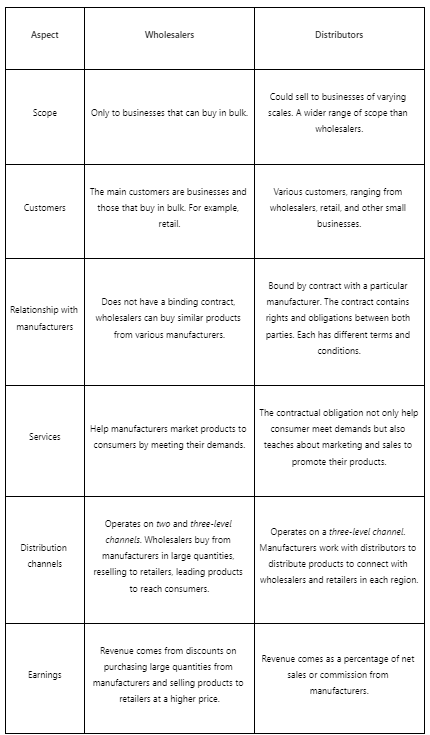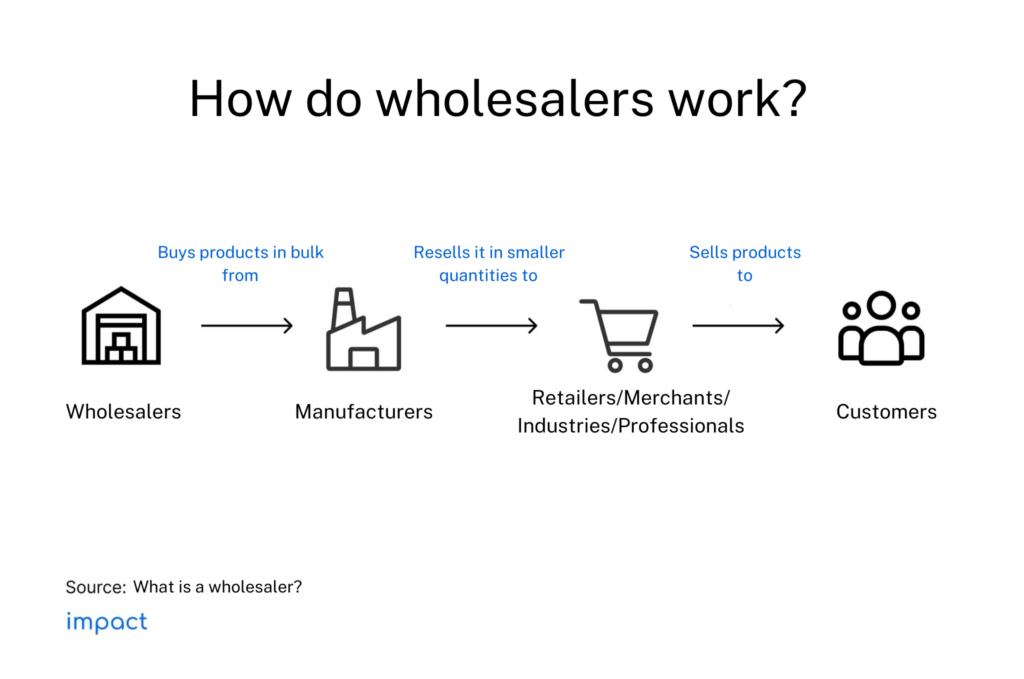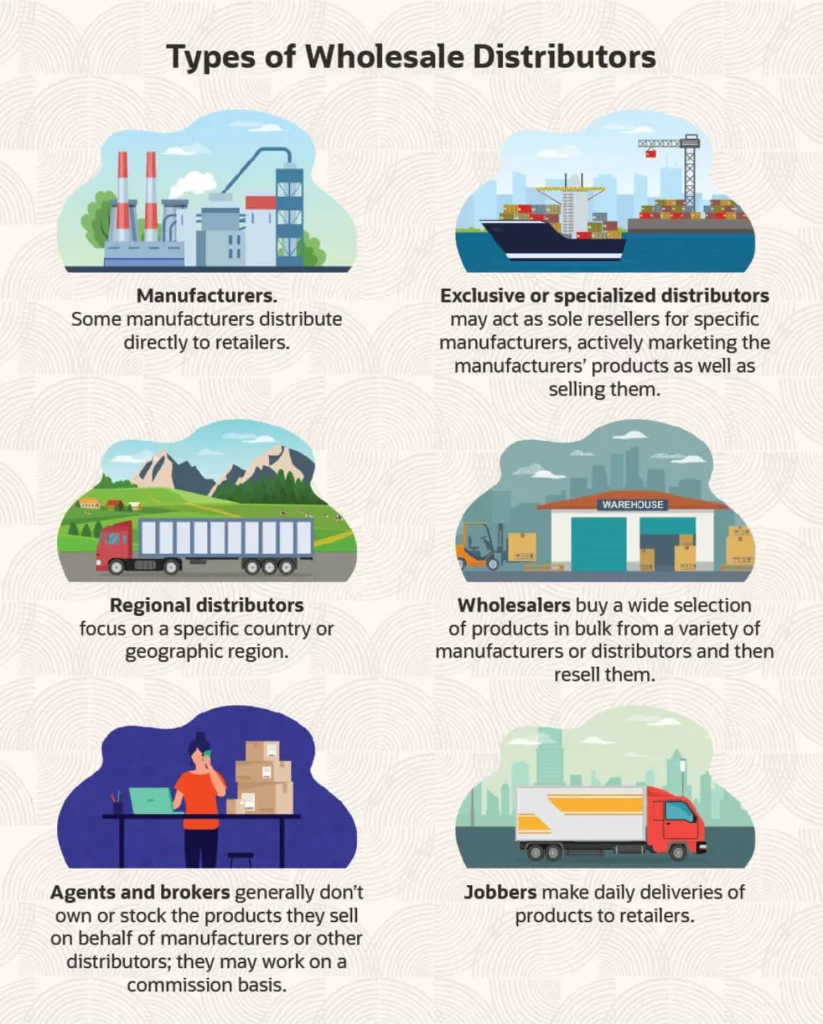Kanban: Definition, 6 Rules, and its Benefits
Kanban is a crucial part of the Just in Time (JIT) system, which we discussed…
Sean Thobias
May 17, 2025A wholesaler is a person or company that purchases bulk products and resells them at a lower price. They take an essential role in the supply chain in fulfilling consumer demands.
The parties involved in this process include manufacturers, wholesalers, retailers, and others that can distribute goods directly to consumers.
Wholesalers differ from distributors. They do not have a binding relationship with manufacturers, which means they can sell similar products from different brands. Through this process, all parties can experience benefits from various aspects.
Besides being beneficial to those parties, the wholesale industry is vital to Indonesia’s economy.
According to a 2022 report Central Bureau of Statistics (BPS), the retail industry, particularly food and beverage (F&B), has become one of the most significant contributors to Indonesia’s GDP — 34.44% or Rp302.28 trillion.
The report also shows a 5.44% (YOY) growth in retail business in September. The statistic indicates wholesalers are vital to the nation’s economy when they supply retailers.
Are you interested in learning more about wholesalers? Read through the article below for a more comprehensive look.
Wholesale is the process of buying large amounts of goods from manufacturers, then selling them back in small quantities at a higher price to consumers. The consumers here may refer to retailers, commercial businesses, institutions, and other wholesalers. Sales proceeds and manufacturer discounts are the sources of a wholesaler’s revenue.
A wholesaler acts as a go-between for manufacturers and consumers to distribute products. Manufacturers need wholesalers to market their products, and consumers need wholesalers to obtain the products they want. Therefore, wholesalers play an essential role in the supply chain.

Wholesalers are responsible for acquiring, managing, and preparing small amounts of products for retailers. They can run well if business owners understand customer needs, market trends, and product prices to build strong relationships with business partners. Wholesalers must build a solid upstream relationship with manufacturers and be trusted by downstream consumers, such as retailers and other businesses.

Simply put, wholesalers deal with two important parties — manufacturers as product owners and retailers as customers that buy the product. It is important for wholesalers to find the right products, according to consumer demand, at a lower price that is high in quality.

Source image: Netsuite; What is Wholesale Distribution? Benefits, Examples & Tips
Companies from a specific market or industry can be involved in wholesale. Each business that is engaged has different business models. This difference makes wholesalers vary. Here are some of them:
Few manufacturers not only sell their products to wholesalers but also directly to retailers. In this case, the manufacturer will wholesale without a middleman. An example of this is boutique manufacturers that sell straight to customers.
Prices received by retailers can be cheaper because there are no go-betweens. However, manufacturers will face competition from traditional distributors already active in the market.
Some distributors are sole sellers for certain manufacturers. In addition to making sales, they will conduct analyses related to the market, marketing, and product sales.
When manufacturers aim to sell their products, they first analyze the different regions to identify product opportunities. This involves studying the customers, languages, trends, regulations, and import procedures of specific countries or regions.
Based on the results, the manufacturers work with regional distributors to sell their products. The analysis helps them understand which products will likely sell well in a particular region and how best to reach the customers in that region.
Several industry sectors distinguish wholesalers and distributors. In wholesale, they buy products in large quantities from various manufacturers and distributors and sell them in smaller amounts. Besides selling, a wholesaler has to set prices, provide storage, and compete for retail needs with their competitors.
Agents and brokers are people who help wholesalers to find official manufacturers with the best quality and price. They do not own or sell their products directly but will focus on finding customers and selling products on behalf of the manufacturer. Unlike drop shipping, agents and brokers can manage products prepared by manufacturers.
Agents and brokers are people who help wholesalers to find official manufacturers with the best quality and price. They do not own or sell their products directly but will focus on finding customers and selling products on behalf of the manufacturer. Unlike drop shipping, agents and brokers can manage products prepared by manufacturers.
Businesses involved in the supply chain can reap the many advantages wholesalers provide. The benefits include:
Manufacturers will spend less investment on expanding their market. By utilizing wholesalers, products can reach consumers without employing extra energy that is more costly. Wholesalers are responsible for distributing products to retailers that are difficult to get.
Wholesaling can simplify business operations for distributors, wholesalers, retailers, and consumers. Manufacturers can work with fewer wholesalers to fill large orders. As for retailers, they can get supplies from a variety of different wholesalers as opposed to just one manufacturer.
Simplifying business operations can reduce the costs incurred by manufacturers and wholesalers. Retailers will find products cheaper if they buy from wholesalers, as there is no need to purchase large quantities of multiple products.
Wholesalers usually own large warehouses to accommodate products and inventory items. The ability to store items can free manufacturers and retailers from the cost of maintaining large stocks of products.
Through inventory maintenance, wholesalers help maintain a stable supply of products. Wholesalers also reduce the risk of shortages for businesses involved in the supply chain.
Many wholesalers operate across various industries in Indonesia, resulting in intense market competition. As a result, these wholesalers are facing several challenges, including:
Wholesalers must be ready to compete with online businesses, as many retailers are shifting to B2B online sales. This means that customers can enjoy the convenience of shopping for lower-priced products with transparent pricing and faster delivery. Additionally, online platforms enable suppliers to sell their products internationally, creating even more competition.
Technological advancement forced us to adapt to the changing times. You can digitally transform to reach a broader range of customers. This digitalization process can start with social media and online marketing. This method helps customers choose and view products that are being sold. You can improve digital marketing by harnessing Google’s algorithms, such as SEO, SEM, etc.
Read more: 8 Best Wholesale Distribution Software Recommendations 2023
A competitive market has resulted in many manufacturers selling directly to consumers. Wholesalers will face challenges as this undermines market prices since manufacturers sell at a much lower price.
Checking how well the manufacturer performs first is a good idea to ensure you get good quality products. This way, you can also make sure they’re not selling directly to consumers or in the same area as you.
The expectations of consumers have risen due to the emergence of online entities, such as fast delivery, real-time visibility of orders, and 24/7 customer service. As such, wholesalers must work extra hard to meet consumer expectations. A solution would be providing other services that online entities do not have, like being able to choose and try products at will.
CRM (Customer Relationship Management) can help manage relationships with consumers. Impact CRM lets you quickly know customer data from the most bought, satisfaction levels, and contact details. With Impact, you can improve customer retention and service, indirectly increasing sales.
In the era of globalization, the downward pressure on prices — especially for commodities — is enormous. Shrinking margins will force wholesalers to increase their efficiency, leading to other forms of stress. There is competition for prices between wholesalers, so it is not uncommon for them to lower costs, resulting in reduced profits.
In cases like this, you could keep a list of prices that vary based on the number of items sold, the location, and the type of customer. You will know what’s the lowest profit you can accept. You can also use volume pricing to encourage customers to purchase more products.
Wholesalers often work in a particular industry that sells certain products. This lets distributors focus on meeting specific product demands and facing regulation within the sector. Here are the four most significant sectors in the wholesale industry:
In Indonesia, the F&B industry is still in high demand by businesses because of the potential of its continuous growth. Despite F&B’s decline during the Covid-19 pandemic, the growth rate has continued to increase. According to BPS, the F&B’s growth rate fell to 1.58% in 2020 but rose in 2021 to 2.549%, and in the second quarter of 2022, it increased further to 3.68%.
This positive trend shows that the F&B industry has prospects that will continue to proliferate. This sector’s growth has impacted retail and wholesale growth, which is increasing to meet customer demands. This industry requires wholesalers to provide raw materials that meet proper hygiene, freshness, storage, and distribution standards.
The healthcare sector has contributed significantly to national economic growth following the Covid-19 pandemic. Despite not having a significant share in the national economy, healthcare continued its surge to reach 10.46% in 2021. This figure is much larger than other sectors dominating Indonesia’s GDP.
The ongoing expansion of healthcare impacts retail and wholesale businesses that supply raw materials and equipment. Wholesale distributors are critical in providing medicines, medical equipment, and other supplies to state-run hospitals and clinics. As a result, it is essential to understand the regulations and procedures involved in handling medical goods for distribution.
Another sector that improved during the pandemic was the information and communication sector. When the economic growth rate declined, this sector increased to 10.61% in 2020. This number even reached 7.14% in the first quarter of 2022. A significant factor of this growth is the emergence of new habits such as working and studying from home.
The need for technology products is growing in Indonesia, affecting the number of wholesalers. Wholesalers not only need to supply everyday technology, but they also have to fulfill orders for advanced electronic products. Keeping up with technology trends and retail meeting demand will be challenging for wholesalers.
A wholesaler is a supplier that deals with many products for B2B businesses and retail customers. They buy products in bulk from manufacturers and sell them in smaller quantities to businesses for resale.
The industrial sector still holds the position of being the most significant contributor to Indonesia’s GDP. However, to get their products to the consumers, the industry requires a middleman to distribute them from the manufacturer to end-users. This is where wholesalers come in.
Wholesalers purchase products from producers in large quantities and then resell them in smaller amounts to retailers at a higher price. The process of wholesaling can benefit producers, retailers, and consumers. To market their products efficiently, many industrial sectors rely on the presence of wholesalers.
Wholesaling involves various parties, and operational activities must be carried out effectively. Data integration and business process automation can help wholesale companies to generate more revenue as the company’s productivity increases.
Impact wholesale distribution can help you automate business processes such as sales, inventory, accounting, and others. It is time to undergo digital transformation. So, take the first step by starting a free demo with Impact.
Impact Insight Team
Impact Insights Team is a group of professionals comprising individuals with expertise and experience in various aspects of business. Together, we are committed to providing in-depth insights and valuable understanding on a variety of business-related topics & industry trends to help companies achieve their goals.
See how our ERP provides better value.
Speak with our consultant to explore how we can improve your accounting, processes, and people.
